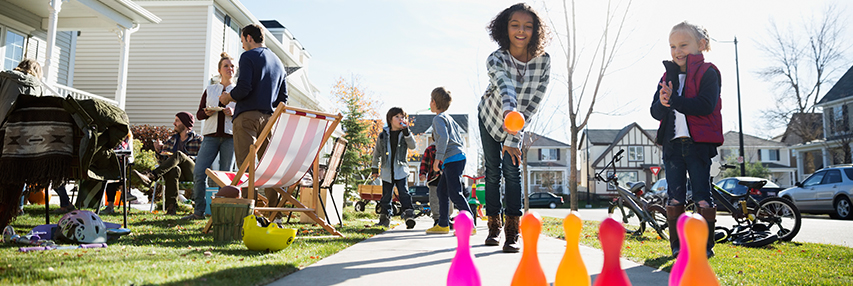How to Choose the Best Neighborhood When Buying a Home
With spring home buying season just around the corner, you may be gearing up for a string of weekends spent perusing open houses. Want to get a jump on your search now? If you haven’t settled on the best neighborhood to buy a home, now’s a good time to do some research.
Choosing the right neighborhood is no small feat, especially if you’re relocating long distance to an area that you don’t know well. While a great neighborhood can make your dream home even dreamier, just one bad neighbor or experience could have you thinking twice about how much you love your new digs. So how can you tell if you’re buying a home in your ideal community, or if you’re about to become financially tethered to a situation you’ll soon regret?
Fortunately, there are a few things you can do to feel more confident about moving to a new neighborhood. After moving myself this past year, I discovered a few ways to scope out a ‘hood before signing on the dotted line.
#1 Start online
If you’re just starting your search, the Trulia site and app can be a wealth of neighborhood information. The app gives you the lay of the land by showing nearby schools and their ratings, restaurants (with Yelp reviews), grocery stores, cafes and other amenities. Trulia also provides a heat map depicting crime and demographic info like median age, marrieds vs. singles, even percent of neighbors with a college degree.
If you want to know more about the actual neighbors, check out the Dwellr app from the Census Bureau. Not only does it help you narrow down your neighborhood search based on preferences like “city vs. country” and “walk vs. bike to work,” it also has comprehensive data on 40 topics for every neighborhood in the country—for example, how many families with children live in the area, what the typical occupations are, and more.
Another notable site is Neighborhood Scout, which offers a lot of the same demographic info as Dwellr with a few intriguing extras. For example, if you love your friend’s neighborhood, you can enter his address into the Match tool to find “twin neighborhoods” in other areas. Scout also provides helpful guides to steer you toward your dream neighborhood (e.g., “Safest Cities in America”) and away from the bad ones (e.g., “Cities with the Highest Murder Rates”).
#2 Join the club
Once you’ve started to narrow your search, it’s helpful to go beyond the data and hear from real people in the area. Luckily, in today’s world, you can do that without leaving the comfort of your own living room.
Start by searching for online forums to join in your preferred neighborhood—you may get lucky and find something as specific as a Facebook group for “wine lovers of Nob Hill.” You can also check out neighborhood groups on Meetup. Even if you can’t make it to the Meetups in person, reading about the events and perusing the comments can give you a feel for the community vibe.
#3 Take a trip
Online research is helpful, but nothing compares to walking the streets of your would-be ‘hood and talking to the people who live there. If possible, try to visit on different days and times. Talk to the neighbors if you can, and don’t be shy about asking them what they like (and don’t like) about living there.
While you’re there, check out your surroundings. Strollers on porches and toys on the lawn can tip you off to a family-friendly neighborhood, while mountain bikes and muddy SUVs suggest the locals take advantage of the area’s outdoor activities. And keep your eyes peeled for red flags like unkempt yards and peeling paint. If the whole ‘hood needs a remodel, chances are the people there don’t take much pride in being a part of the community.
#4 Try before you buy
If you’re really on the fence about a new neighborhood (or you don’t live close enough for a day trip), your best bet may be a trial run. Rent a place in the area and stay there for a few days to a few weeks (depending on what you can afford). This idea has become so popular that Airbnb now partners with Realtor.com to offer up rentals near the home the user is considering.
The takeaway
You can make a lot of changes to your home, but changing your neighborhood is a lot harder to do. Taking the time to research the best places to live ahead of time can make the difference between a long, happy stay and feeling the need to get out of Dodge before you unpack the last box.
What are some of your favorite ways to scope out a neighborhood before you buy? Any apps, tools or tricks we missed here?






holly cow i wil o dthat
Theres four minutes I’ll never get back. Zero information on “HOW” like the tile says – just tells you WHERE to go (hint:NOT this article.)
and by the way, how about old fashioned face to face talking with the neighborhood. Walk around at different hours on different days.
Pingback: HOW TO CHOOSE THE BEST NEIGHBORHOOD WHEN BUYING A HOME – Welcome home
Enough of the Ebonics. A hood is something over ur head. Front of a car etc so stop trying to be cool or whatever. I’ll be looking for a home in a quiet peaceful neighborhood or area. Even the bad guys know what that is.
The ESRI zip code loolup demographic site can help unders tand a zip code, though not a “neighborhood.” Tapestry shows the largest demogrpahic groups in an zip with description of the group. For example in my zip code the three largest groups are “bright young professionals, in style, and soccer moms. You can also get age, income data. etc. These categories give you an impression if you want to live around segments like that.
Did I miss something? That is exactly what the article said.
A stranger walking around a neighborhood scoping out the homes – with particular attention to homes with “strollers on porches and toys on the lawn” is likely to get beat up or arrested; branded as a potential burglar or pedophile. Really, it is not wise for a stranger to wander around a neighborhood checking out the way people are living there. Unless it is some densely populated urban area, you will stick out like a sore thumb and the residents will likely get the wrong idea.
I think the author actually edited the article to incorporate that comment.
crimereports,com needed a mention
maybe u should have talked to a realtor before writing this
thanks
tom
Watch out for the information on Trulia and other similar sites. Their information is very often notoriously inaccurate. We are in the process of selling our house now and its very frustrating to see the school listing for our house, as most of the schools are close by but not in the same town and not an option. This information gives people entirely the wrong impression. Sites that list estimated home values are also very inaccurate as they often seem to rely on tax documents that are, in some cases, not updated for several years. They also assign a value to a house without ever seeing the house, so sometimes their estimates are all over the place, and also inaccurate. Take the web information with a grain of salt. Its very often not so good.
It is also a good idea to look at maps to determine if any airport runways are going to arrive/depart overhead. Don’t just check commercial airports, look at military and community air fields. Trust me, the runways will not relocate for you.
Isn’t it against federal law for a realtor to “sell the neighborhood”?
This was really helpful. I’ve been so focused on the schools, I forgot about the other things that make a home and community. I feel more at ease making the decision to leave a superb school zone (because I hate where I live) to finding a place that will be a good community for my daughter to grow.
Yes it is. It’s also illegal to try to get a certain type of person to either live in or discount an area. It’s called “blockbusting”. Anyone can live in any neighborhood to tell you different is illegal and should be reported to the local board of realtors in the city.
A major element in any neighborhood is the ratio of rental properties to owner occupied. This is a crucial statistic and I can’t believe it was not mentioned in the article.
It is a constitutional right to traveil. I wish neighbors would pay attention to intruders. Frequently, neighbors are at work when the unwanted intruders pass through. Cops rarely file trespassing cases when intruders are actually trespassing. Why would they take the time to make false allegations.
I really like your tip about starting online when it comes to buying a home. My husband and I have been looking for a new home to buy for a while now so we will have to keep these tips in mind. We are really excited to get the whole process started so thank you for sharing! http://www.bestclarksvillehomes4u.com/featured-searches/clarksville-tn/
We’re glad you found it helpful, Danni!
I like your idea of renting a place in the area you are looking at. That can give you a good idea of whether or not the neighborhood will fit. My wife and I are trying to find a neighborhood in which to buy our first home, and it hasn’t been easy. We will have to give this a try, thanks! http://www.floabke.com/Pages/St_Clair_Shores_MI.aspx
Thank you for talking about visiting a community before you buy a house in it. It makes sense that doing this ca help you have a feel for the environment and make sure you will feel comfortable there. I can see that consulting with a real estate agent can help facilitate this process and help you find what you are looking for. http://www.mirabellaflorida.com/about-us
A friend of mine has been thinking about getting a house for a while now, but wasn’t sure how to choose the right one. It’s interesting that you say to visit the location on different days and times. It would be nice to see the traffic in the location, and to see what kinds of noise levels there are. https://homenation.com/